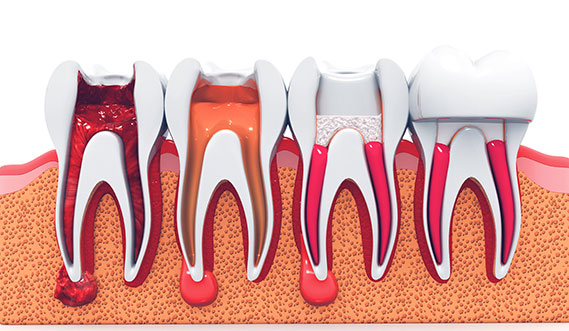Happy Smile,
Happy Life.

Signs
Pain, prolonged sensitivity to heat or cold, tenderness to touch and chewing, discoloration of the tooth, and swelling, drainage and tenderness in the lymph nodes as well as nearby bone and gum tissues may be signs that you require root canal therapy.
Root Canal Explained
A root canal has long been the treatment of choice for teeth whose roots have been damaged, whether by trauma or decay. Your dentist will numb your tooth before creating an opening through the crown of your tooth to access the pulp chamber. Then, he or she will clean out the infection and remove any unhealthy pulp to prep the tooth for the filler. Permanent fillers, usually made out of a material known as gutta-percha, are placed into the canals to prevent future infection or contamination. You’ll get a temporary filling until a permanent one (called a crown) can be placed on your tooth to seal the opening.
Different tooth types present different problems and therefore require different levels of treatment. Root canal costs can be broken down into anterior teeth, premolars, and molars. Anterior teeth include all of your front teeth, called incisors and cuspids (commonly called canine teeth).
After the final visit with your dentist, you must return to have a corwn or restoration placed on the tooth to protect and restore it to full function. There are several different types of crowns. The most common are porcelain (or ceramic), metal, and porcelain-fused-to-metal (PFM).
Porcelain crowns look the most like regular teeth. But they are prone to chipping and can damage your natural teeth. Metal crowns are hard, bond to teeth well, and last the longest. They don’t damage your other teeth either. PFM are durable and bond to teeth well. However, they can still harm natural teeth.
Benefits of Root Canal
A root canal preserves your natural tooth, which has its perks. It’s also less invasive than dental implant surgery. Unfortunately, there’s a chance that the procedure won’t be successful. Root canals sometimes have to be redone 5 to 10 years down the road, and if your root canal fails, there’s a good chance that the tooth will have to be extracted anyway.
Get it done early. Don’t hesitate if you need root canal therapy. Waiting on tooth decay or damage always make things worse. And once you set the process in motion, don’t allow delays. Try to schedule the treatment itself and whatever restoration is necessary right after each other. Speed minimizes damage, pain and price.

